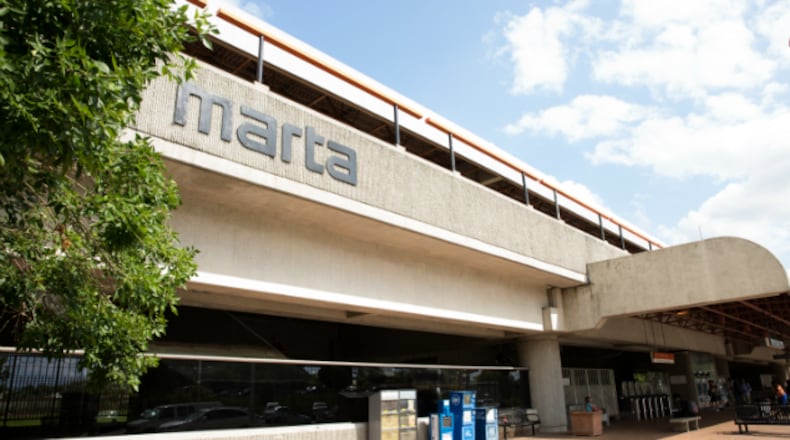Brookhaven city officials were kept in the dark about MARTA’s plans to close the station there until it was announced to the public — less than six weeks before the closure happened.
The lack of communication about the busy station in the heart of downtown surprised city officials and disappointed advocates, who said more time would have allowed them to better communicate and notify commuters of their options during the six-week closure.
“This is the first I’ve heard of this at all!” Brookhaven City Council member Jennifer Owens wrote when forwarding the public announcement to other elected officials and the city manager on Aug. 28.
“Apologies that you’re learning it from this email and not from me firsthand,” a MARTA official wrote to the group after another City Council member reached out to him for information.
After the communication hiccup, MARTA commenced construction as planned on Oct. 7 and now is more than halfway done replacing the crumbling 40-year-old pavers on the Brookhaven/Oglethorpe station’s platform. The work is part of a multi-year, $1 billion effort to rehabilitate all 38 of the transit agency’s stations.
It’s critical work — the missing pavers in Brookhaven created tripping hazards and limited accessibility — that local officials and riders alike are excited to see. But Brookhaven officials and rider advocates said they’d like to see better communication from MARTA, as well as greater effort to avoid lengthy station closures that disrupt riders’ commutes.
Most of the station renovations are still to come, and advocates said they are hoping for better communication from MARTA in the future.
“MARTA doesn’t operate independently in a vacuum,” Owens said in an interview. “They are very much embedded in the communities in which they’ve got stations and bus lines, and we’ve got folks that rely heavily on them. Having that information and being able to participate in the conversation is so critical.”
The renovations at the Brookhaven station are the second time this year MARTA has closed a station for an extended period. Similar repaving was done at the Airport station beginning in April, closing that station for six weeks. Renovations at Five Points, which would have resulted in much lengthier disruptions for pedestrians and bus riders, were scheduled to begin over the summer but were put on hold in part because of concerns by city of Atlanta officials about the impact of the closure on the busiest MARTA station.
An estimated 2,500 people use the Brookhaven train station daily.
The station is expected to reopen Nov. 15. Until then, trains are skipping the station. MARTA is providing bus shuttle services for riders to get on or off the Gold Line at either Lenox Station to the south or Chamblee Station to the north. The shuttles add about 15 minutes to travel times, MARTA has estimated.
MARTA officials said closing the station will cut construction time by two years and save $9 million. The whole project is expected to cost $13 million.
Brookhaven spokesman Burke Brennan said city officials knew MARTA had funded the Brookhaven station renovations but didn’t know when the work would commence. He said there was initial surprise among city staff and elected officials when they learned the start-date details from the public notice, but there are no lingering hard feelings.
“These things sometimes happen,” Brennan said. “We got through it.”
Stephany Fisher, a MARTA spokeswoman, said the agency is “diligent about making sure elected officials and staff within our jurisdictions are informed about upcoming construction projects that will affect their constituents and our customers.”
She said MARTA notified many officials about the Brookhaven project, beginning with an update to DeKalb County commissioners on May 7. MARTA provided notice to Brookhaven City staff on Aug. 23, while Mayor John Park and City Council members were told on Aug. 28, the same day as the public, according to Fisher.
Typically, officials in partner jurisdictions are notified before the public, Fisher said. It’s unclear why that didn’t happen in this instance, but she added that everyone was still notified more than five weeks before the closure.
More time would have been helpful, said Lily Pabian, the executive director of We Love BuHi, a nonprofit that documents immigrant stories. Pabian reached out to Brookhaven officials with concerns on Sept. 9, including about the lack of translated information available about the closure.
With more notice, organizations like hers could have helped with outreach to riders, particularly non-English speakers, to better ensure no one was caught by surprise on Oct. 7, Pabian said in an interview with the AJC.
“Help us help you,” she said.
Rebecca Serna, who leads Propel ATL, a bike, pedestrian and transit advocacy nonprofit, echoed Pabian’s concerns and said MARTA missed an opportunity to collaborate with the transit-supportive Brookhaven City Council.
“They want to support transit so much that they moved their City Hall to be right next to a transit station,” Serna said. “Let them know in advance.”
Serna said it would help to have greater transparency around MARTA’s schedule for future projects since all 38 stations will have work done at some point.
“They continue to not announce until it’s imminent,” Serna said.
Fisher said MARTA does not have a station rehabilitation schedule “per se because so many things must be considered and can impact project timing.” But five stations are next in the queue: Airport (phase two), Garnett, H.E. Holmes, Indian Creek and Peachtree Center. It is unclear if those stations will
A two-day closure at Indian Creek, scheduled for Dec. 8-9, was announced last month. No announcements have been made for dates and potential closures of the other stations.
Beyond more notice, both Serna and Pabian said they’d like to see MARTA find a way to complete the work without having to close stations entirely. Serna said the trade-offs aren’t worth it when MARTA is still struggling to regain ridership after the pandemic.
“Things like this that don’t prioritize the needs of the rider are detrimental to that recovery,” she said.
MARTA has made one of the slowest post-pandemic recoveries of any U.S. metro, according to a Federal Transit Administration report released in August.
Transit ridership in the largest urban areas bounced back to 71% of 2019 levels on average as of September 2023, the FTA reported. Atlanta’s ridership recovery was below average and ranked second-to-last, ahead of just Phoenix, Arizona.
In 15 cities, ridership has surpassed pre-pandemic levels.
Agencies that can’t increase ridership may eventually be forced to either cut service or raise fares, decisions the FTA warned could lead to a “death spiral of reduced ridership and service.”
In the first three months of the new fiscal year, MARTA’s rail ridership has continued to fall. It’s below 2023 levels and far short of the forecast. By contrast, bus ridership has been on track or exceeded forecasts.
Pabian said a lot of MARTA’s focus seems to be on preparations for the World Cup, which Atlanta will host in 2026, as well as other upcoming marquee events. She said the organization needs to remember its daily riders, too.
“Are we putting them at the forefront?” she asked.
About the Author
Keep Reading
The Latest
Featured



